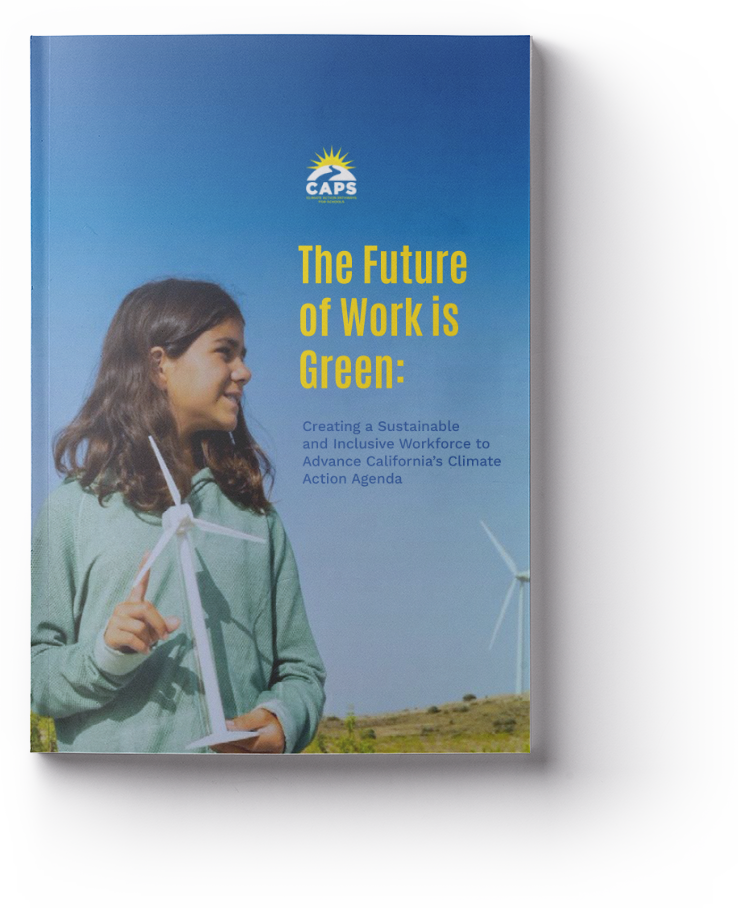Preparing California Students to Lead the Green Economy
Data reveals that in the next 30 years, the transition to a sustainable economy will create more than 4 million new green jobs in California, presenting unprecedented opportunities for today’s students. CAPS and our partners are providing hands-on training that prepares students with the skills and experience needed for these lucrative in-demand green careers.
The demand for green job skills is outpacing the workforce, making it crucial for California’s K-12 schools to prepare students for green careers and climate action. Climate Action Pathways for Schools (CAPS) partners with under-resourced districts to equip students with the skills and opportunities needed for these careers. Our efforts are backed by research and corporate support, which includes mentorship, guidance, and funding. See recent reports on the expanding green economy developed with our corporate partners below.
2024 Report — “Driving the Future: Accelerating the Green Transportation Workforce”
California’s Career and Technical Education (CTE) programs have a significant opportunity to integrate zero-emissions and electric vehicle training and equip high school students with the skills needed for careers in the fast-evolving green transportation industry. Our new “Driving the Future” report explores how CTE programs can better prepare students as the demand for a clean mobility workforce rises.
Driven by California’s ambitious targets—such as achieving zero-emission for all new cars and trucks by 2035—the CAPS and Accenture partnership focuses on Electric Vehicle (EV) Learning Content. This initiative helps align CAPS interns' skills with industry needs, enhance their employability in green jobs, and contribute to the state’s goal of reducing greenhouse gas emissions by 40% from 1990 levels by 2030.
Key report highlights include:
The transportation sector is expected to see a 9% growth in green jobs over the next decade
There's a notable gap in California’s CTE programs regarding new technologies like zero-emissions vehicles
Download the Full “Driving The Future” Report
Get EV Learning Modules
We've developed seven learning modules to incorporate zero-emissions and electric vehicle learning content into high school education to aid in preparing students for careers in the fast-paced and evolving green transportation industry.
The modules include:
Module #1: Introduction to Zero-Emission Vehicles
Module #2: ZEV Policy and Regulation
Module #3: How Zero-Emission Vehicles Work
Module #4: Types of Zero-Emission Vehicles
Module #5: Charging Infrastructure and Range
Module #6: Environmental & Economic Impact of ZEVs
Module #7: Innovations in Zero-Emission Vehicles
Explore the need and opportunities to upskill California's transportation workforce in alignment with the state’s clean mobility goals. This report highlights how schools can integrate ZEV/EV learning content into existing Career Technical Education programs.
“The Future of Work is Green” Report
Despite California currently having the highest number of people employed in the green jobs sector, with over 800,000 individuals working in green jobs, the state is projected to face a talent shortage unless immediate steps are taken to train and prepare the future workforce. Addressing the skills gap is vital to support the climate agenda and drive the transition toward a greener economy.
Key report highlights include:
Financial advantages of green jobs compared with non-green jobs
Skills and competencies needed to fulfill the job gap
The role of K–12 schools in preparing the next generation with the knowledge and skills for sustainable careers
Recommendations for delivering equitable support to communities to ensure historically disadvantaged communities can seize green workforce opportunities
The “Future of Work is Green” report by CAPS, developed in partnership with global consulting firm Accenture, offers insights into the expected workforce gap and subsequent need for training and education. The analysis in the report provides data on the most in-demand jobs and shares recommendations for leveraging schools to prepare the next generation of green jobs talent to support California's rapidly growing economy.
Download the Full “The Future of Work is Green” Report
Discover how sustainability is shaping job opportunities and transforming industries. Fill out the form below to receive your copy and stay ahead in the evolving landscape of green careers.
PARTNER WITH US
Effective climate action requires a collaborative effort among the education community, industry, government agencies, and policymakers. One of the most important aspects is training the workforce and providing equitable opportunities that equip students with the necessary sustainability skillset. By collaborating with CAPS, you can play a crucial role in helping to train and prepare the workforce of the future, benefiting both the local economy and the environment. Our partnership opportunities include corporate sponsorships, skills training, internships/apprenticeships, staff volunteer opportunities, and more.
Together, we can bridge the skills gap and contribute to a sustainable and prosperous future for all.





